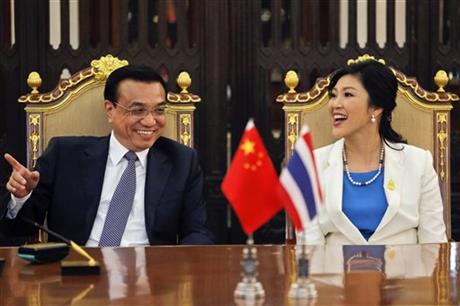
Chinese Premier Li Keqiang, left, and Thailand’s Prime Minister Yingluck Shinawatra share a light moment during their meeting at the government house in Bangkok Friday, Oct. 11, 2013. Li is on a three-day visit to Thailand. (AP Photo/Damir Sagolj, Pool)
BANGKOK (AP) — Chinese Premier Li Keqiang became the first foreign leader to address Thailand’s Parliament in more than a decade Friday as he began a three-day visit aimed at strengthening ties and seeking business for his country’s high-speed railway technology.
Li’s speech underscored China’s growing influence in Southeast Asia a week after Chinese President Xi Jinping delivered the first speech by a foreign leader to Indonesia’s Parliament.
Li told the Thai lawmakers that Thailand and China will boost their trade to $100 billion by the end of 2015 and that China will buy more Thai agricultural produce.
“In the next five years, China will import 1 million tons of rice from Thailand and will also import more rubber,” Li said.
Thailand’s government has struggled to sell much of the rice it has amassed in a rice-buying scheme that is a flagship policy of Prime Minister Yingluck Shinawatra’s administration. The scheme has accumulated losses of at least $4.46 billion since it was introduced in 2011. Its inability to resell the high-priced rice on the international market allowed India and Vietnam to surpass Thailand in the value of their rice exports.
Thai rubber farmers have staged a series of street demonstrations and blocked roads in recent months to pressure the government to shore up rubber prices, which have dropped since peaking in 2011 due to weak demand in a sluggish global economy.
Li, who became premier in March, is the first foreign leader to give a speech in Parliament in at least 10 years. House speaker Somsak Kiatsuranont said he granted Li “an opportunity to speak directly to the representatives of the Thai people” because his visit was an “honor.”
Li asked the lawmakers to support Chinese train technology. He is to open an exhibit on China’s high-speed rail system in Bangkok on Saturday.
The two governments also signed memorandums of understanding on cooperation in railway projects, investment, energy, culture and other areas.
“China has expressed interest in helping to develop the high-speed railway. On this, in principle, Thailand is willing to work with them at the government level and is asking to pay part of the expenses with agricultural produce,” Yingluck told reporters after meeting with Li.
Last month, Parliament authorized 2.2 trillion baht ($70 billion) in loans for large transportation projects, including four high-speed rail lines that would connect Bangkok to other key cities and dual-track rail lines that could reduce the country’s dependence on road transport.
Li is to travel to Chiang Mai, Yingluck’s hometown in northern Thailand, and then leave for Vietnam on Sunday.
The Thai Cabinet invoked the Internal Security Act in three Bangkok districts prior to Li’s visit to pressure a group of anti-government protesters to leave an area near the prime minister’s office where they had camped out. The law allows authorities to seal off roads, take action against security threats and impose curfews.
The demonstrators dispersed Thursday after being promised that they could return to the protest site after the Chinese premier’s visit ends.



